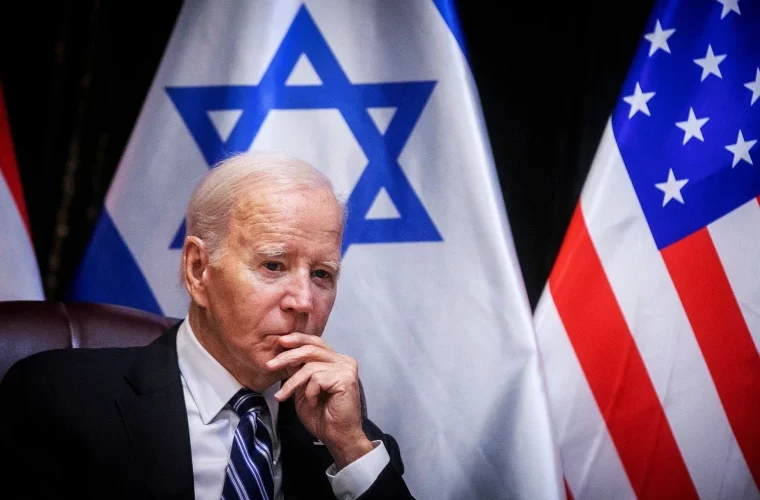Introduction:
President Biden’s recent criticism of Israel has brought attention to the complex dynamics surrounding the ongoing Gaza war. This article delves into the nuances of Biden’s critique, shedding light on the underlying concerns, diplomatic ramifications, and the evolving landscape of the relationship between the United States and Israel during this challenging time.
Biden’s Criticism of Israel Amid Gaza War:
President Biden’s public criticism of Israel during the ongoing conflict in Gaza signals a departure from traditional U.S. support for its ally. The critique underscores growing concerns about the humanitarian impact of the conflict and the need for a diplomatic resolution.
Key Concerns Highlighted by Biden:
- Humanitarian Impact: President Biden has expressed concerns about the humanitarian toll of the conflict, emphasizing the need to avoid civilian casualties and address the pressing humanitarian needs of the people in Gaza.
- Diplomatic Solutions: The criticism aligns with a broader call for diplomatic efforts to bring about a ceasefire and engage in constructive negotiations to address the root causes of the conflict between Israel and Palestinian factions.
- International Perception: The public criticism may also reflect a consideration of the international community’s perception, as the U.S. navigates its role in promoting stability in the region and addressing global concerns about the ongoing hostilities.
Diplomatic Ramifications and U.S.-Israel Relations:
- Shift in Tone: Biden’s criticism marks a notable shift in the tone of U.S. statements regarding Israel. This change may impact the dynamics of diplomatic relations and influence future collaboration between the two nations.
- Domestic Considerations: The Biden administration’s approach is also shaped by domestic considerations, including the diversity of opinions within the U.S. political landscape and public sentiment on the Israel-Palestine issue.
- Broader Middle East Policy: The critique fits into the broader context of the Biden administration’s approach to the Middle East, where it seeks a more balanced and multilateral engagement in addressing regional conflicts.

Evolution of U.S. Policy in the Region:
- Historical Support: While the U.S. has historically been a staunch supporter of Israel, recent administrations, including the Biden administration, have shown a willingness to adopt a more nuanced approach in addressing conflicts in the region.
- Commitment to Diplomacy: President Biden’s emphasis on diplomacy aligns with a broader commitment to reengage with international institutions and pursue diplomatic solutions to global challenges.
- Balancing Interests: The Biden administration faces the delicate task of balancing its historical alliance with Israel with a commitment to human rights and diplomatic processes, reflecting a nuanced approach to the complexities of the region.
Analyzing Biden’s Criticism: A Comparative Insight
| Aspect | Biden’s Criticism of Israel | Diplomatic and Regional Considerations |
|---|---|---|
| Humanitarian Focus | Addressing Civilian Concerns | Shaping U.S. policy in alignment with global humanitarian values. |
| Diplomatic Priorities | Promoting Peaceful Resolutions | Reflecting a commitment to resolving conflicts through diplomacy. |
| U.S.-Israel Relations | Navigating Evolving Dynamics | Balancing historical alliances with evolving global and regional priorities. |
| Public Opinion Impact | Influencing International Perception | Recognizing the impact of public sentiment on diplomatic decisions. |
Navigating Diplomatic Challenges: Strategies Moving Forward:
- Multilateral Diplomacy: Engaging in multilateral diplomatic efforts involving key stakeholders to foster a collective approach in addressing the root causes of the conflict.
- Humanitarian Aid: Emphasizing and providing support for humanitarian aid to the affected populations, showcasing a commitment to alleviating the immediate suffering caused by the conflict.
- Long-Term Conflict Resolution: Pursuing diplomatic initiatives that aim not only at ceasefire agreements but also address the underlying issues, contributing to a sustainable and lasting resolution of the Israel-Palestine conflict.
Conclusion:
President Biden’s criticism of Israel during the Gaza war reflects a nuanced approach to the complexities of the region. As the U.S. navigates evolving diplomatic challenges, the emphasis on humanitarian concerns and diplomatic solutions underscores a commitment to promoting stability and addressing the root causes of the conflict. Moving forward, the Biden administration’s strategies will play a crucial role in shaping the trajectory of U.S. involvement in the Middle East and its relationships with key regional players.












